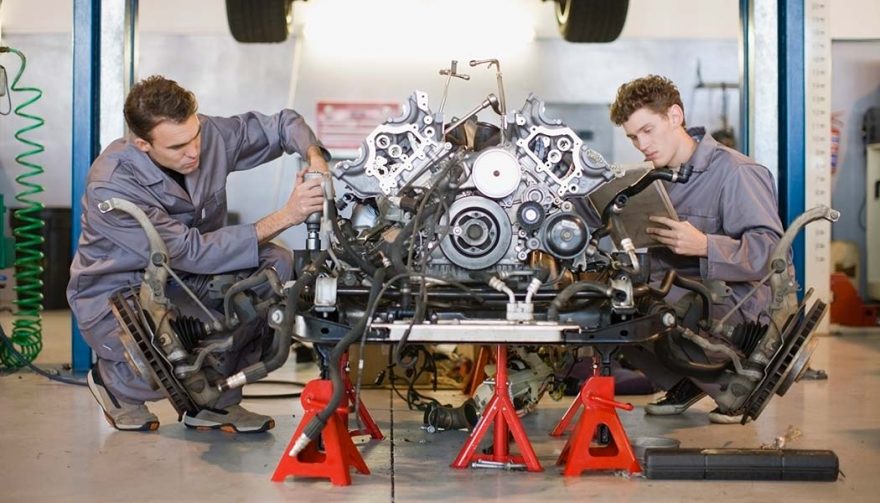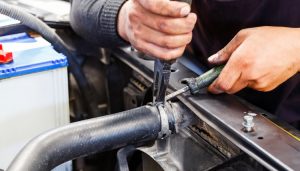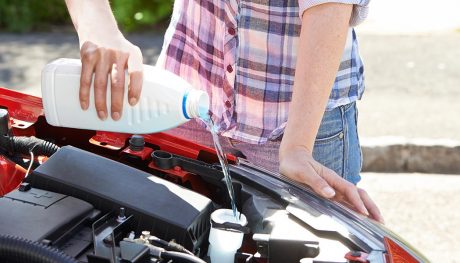
Lots of the most expensive car repairs are avoidable
10 Very Expensive, But Avoidable, Car Repairs
Regrets. Every car owner has them about car maintenance they neglected that resulted in a big repair bill. Don’t be that car owner. Here are some of the most expensive car repairs that can easily be prevented.
Worn Out Automatic Transmission
Inside your automatic transmission are many friction surfaces that grind away at each other as you drive. They slowly wear out. Other parts that wear out are the many bronze bushings that carry the spinning gears, shafts and drums. The heat in there is over 200 degrees Fahrenheit, and it’s hottest when you crawl through stop-and-go city traffic.
Lubricating all those expensive parts is only about 10 quarts of very thin fluid. The thin fluid breaks down from the heat, loses its lubricating ability, and picks up the sandy friction material that wears off the clutches and bands. That abrasive slurry causes havoc on your checkbook.
Good grief, replace the transmission fluid and its filter in your car, and do it often, more often than the factory recommends. Ask your mechanic how often he replaces the transmission fluid in his cars. Its cheap insurance against a very expensive repair.
While you are at it, have an auxiliary transmission fluid cooler installed. If not, start saving two, three or four thousand dollars, maybe even more, for a rebuilt transmission. The choice is yours.
Failed Air Conditioning Compressor
That little compressor will pump refrigerant at extremely high pressures, over 300 pounds per square inch, on a hot summer day. That’s 10 times the amount of pressure in your tires.
Besides the searing heat and pressure, the compressor sucks in very cold refrigerant gas at close to freezing temperatures. That sudden jolt of cold against hot metal inside the compressor takes its toll.
The only lubrication the hapless compressor receives is the small amount of special oil that circulates with the refrigerant. Since it’s normal for cars to seep refrigerant out over time, oil escapes along with it.
The common mistake when your A/C stops cooling well is to only add Freon, but no oil. That leaves the compressor very under-protected.
You need to add the proper type of oil as well, before you add the refrigerant. Protect your expensive A/C compressor with $10 worth of oil. Make sense?
Overheated Engine on a Long Trip
You’ve seen cars on the side of the road with their hood up and steam bellowing out from the radiator. The thermostat failed, which is a simple, inexpensive part. If the unlucky travelers drove their overheated car very far, chances are good they ruined the engine. All because they didn’t replace a $20 part soon enough.
Replace the thermostat every 100,000 miles, or any time you have a cooling system repair done, like replacing the water pump. Feel safe on long trips.
Leaking Intake Manifold Gaskets
Sure, coolant is supposed to last 100,000 miles. But as it circulates in the engine’s cooling system it builds up a slight electrical charge. It’s from static friction and from the chemicals that it accumulates from tiny seeps in the head gaskets.
All that attacks the aluminum intake manifold, typically where it meets the cast iron cylinder heads, and makes a coolant leak. Very expensive to have repaired.
Coolant, though, is cheap and easy to replace compared to all that. Every 30,000 miles is a good replacement interval. Again, a little over-maintenance is cheap insurance against the chances of expensive repairs.
Rotted and Leaking Heater Core
OK, so you are resisting buying two gallons of new coolant to do the cooling system flush. And you think your luck will hold against the intake manifold gaskets. But another part that corrodes from the electrical charge and chemicals in coolant is the heater core.
The parts are not very expensive, but the eight hours of labor to replace it is. Flush your cooling system every three years.
Bent Engine Valves
Trying to squeeze a few thousand extra miles from your timing belt? After all, it is a fairly expensive maintenance item.
But if the belt breaks it will likely cause bent valves. Then the engine needs a major, expensive repair. Read your owner’s manual to learn the proper replacement interval for your timing belt. It’s a big gamble to stretch your luck with it. The odds aren’t worth it.
Ruined Brake Rotors
That high-pitched squealing you hear when braking is from the warning tabs telling you that you need new brakes. Ignore the noise and the rotors will be scored beyond repair.
Sticking or Leaking Fuel Injectors
If you saw how small fuel injectors are you would wonder why they are so expensive to replace. The injectors have to be replaced when they begin sticking from gummy deposits in their internals. These parts are manufactured with surgical precision and don’t do well with foreign matter jammed inside them.
Keep them clean. Every 3,000 miles add a water remover and fuel system cleaner to your gas tank. Do it when the tank is almost empty. Either that, or start saving big money for a new set of injectors.
Failed Fuel Pump
Replacing your fuel pump is a fairly involved operation. Running low on fuel overheats the electric fuel pump, as neglecting to replace your $20 fuel filter does.
A dirty fuel filter causes a restriction that forces the pump to work extra hard. It doesn’t mind, until it gives up. Have your fuel filter replaced every 60,000 miles.
Bad Alternator
You had your car jump-started, then relied on the alternator to recharge your dead battery. But alternators are designed to supply a steady, smooth current, just enough to keep your car running.
Overloading an alternator for an extended time, like using it to recharge a dead battery, overheats and ruins it. Don’t do that.





